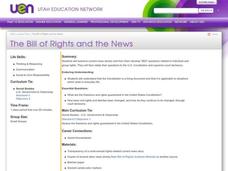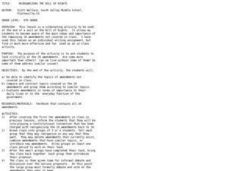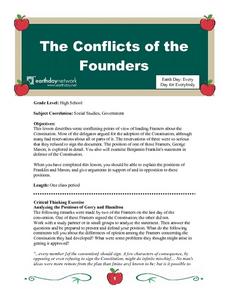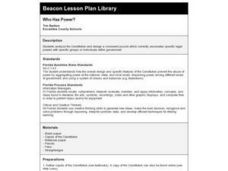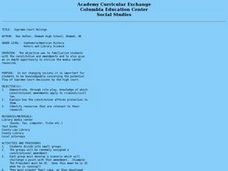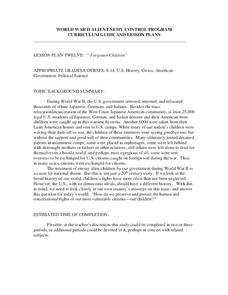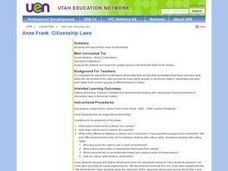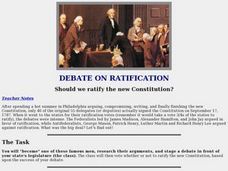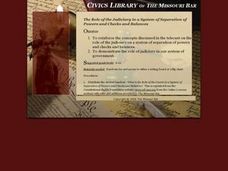Federal Reserve Bank
Quantitative Easing Explained
Dig deeper into the financial crisis of 2008 in the United States and actions taken by the federal government, including the bailouts and purchase of institutions as Fannie Mae and Freddie Mac, to bolster financial market conditions.
Museum of Tolerance
Citizenship Then and Now: Comparing Ancient Rome and Contemporary American Society
Class members research citizenship in Ancient Rome and in the United States and use the provided graphic organizers to compare the rights and responsibilities of citizens in these two democracies.
National Park Service
Civil War to Civil Rights: From Pea Ridge to Central High
Explore how the Civil War impacted the Civil Rights Movement. Class members complete a series of projects for a unit that uses a layered curriculum approach to learning.
Judicial Learning Center
The Judge and the Jury
Unless you are a lawyer, you might not understand just how unrealistic Law and Order and other legal dramas actually are. Here's a great resource to help scholars of criminology gain a more realistic perspective. The lesson outlines the...
Curated OER
Constitution
Fifth graders explore the importance of the Constitution. They read and discuss the meaning of each section. In groups, 5th graders create posters explaining an assigned part of the constitution. Using the internet, students research and...
Curated OER
Lesson I - Why is Delaware Called "The First State"?
Learners discuss why Delaware is called the First State, research background leading to Delaware's ratification of United States Constitution, complete worksheet on United States Constitution, and work in groups to choose an individual...
Curated OER
The Bill of Rights and the News
Students examine current news stories and from them develop "BIG" questions related to individual and group rights. They then relate their questions to the U.S. Constitution and supreme court decisions.
Curated OER
What Is the Bill of Rights?
Young scholars discuss the purpose of the Bill of Rights and the United States Constitution. In groups, they write about the ten amendments and their purpose. They re-word the Amendments in their own way and answer discussion questions...
Curated OER
Justice
Students consider the role of justice in the formation of the United States and in the operation of today's criminal justice system. They investigate symbols associated with justice and references to justice in the Constitution.
Curated OER
Powerful Signatures
Students experience famous historical documents that were initiated and propelled by signatures such as Declaration of Independence, U.S. Constitution. They create a school amendment using the information gathered.
Curated OER
Reorganizing the Bill of Rights
Eighth graders look critically at the 26 amendments to the United States Constitution.
Curated OER
Supreme Court: Background
Students explain the role of the Supremem Court under the Constitution. They explore current evetns related to the Constitution and read about the roles of the Senate and President in selecting the next justice. They create a chart about...
Curated OER
The Government and Natural Rights
Students are introduced to some basic ideas the Framers used in creating the kind of government they thought would best protect the natural rights of each individual and promote the good of all. At the conclusion of the lesson, they know...
Curated OER
The Conficts of the Founders
High schoolers discuss the often conflicting viewpoints of the framers of the Constitution. One Framer in particular, George Mason, strongly objected to the creation of the Constitution. His objections are explored and the Constitutional...
Curated OER
Who Has Power?
Fourth graders discuss abuse of power in government and examine the Constitution for specific powers in each branch. They create a crossword puzzle utilizing terms and information regarding division of government powers and federalism
Curated OER
Supreme Court Rulings
Become familiar with the constitution and amendments with an in depth opportunity to utilize media center resources. Groups of students focus on an amendment then make a presentation to the class.
Curated OER
What is Meant by Returning to Fundamental Principles?
Students apply the principles and ideas suggested by the Constitution to a contemporary issue or problem, and work through the issue to reach their own conclusions.
Curated OER
Judging Acts
Students research Canada's political history by analyzing the country's constitution. To display their understanding, students write essays.
Curated OER
World War II Alien Enemy Control Program
Students become familiar with the concepts of human rights and constitutional rights. They have an increased awareness of the historical record as to the cessation of these rights, especially in regards to children during WWII. It is...
Curated OER
"Martial Law in Hawaii After the Attack on Pearl Harbor"
Students explore the concepts of martial law, writ of habeas corpus, due process, discovery and human and constitutional rights during World War II. They assess the roles and responsibilities of government leaders and citizens during...
Curated OER
Anne Frank: Citizenship Laws
Young scholars study early civilizations and the contributions they made to the foundations of human culture. They discuss why citizenship is valuable and the Constitutional Amendments that are associated with it.
Curated OER
Debate On Ratification
Middle schoolers simulate a delegate that was responsible for the Constitution. They research their arguments, and stage a debate in front of the state's legislature (the class). The class then vote whether or not to ratify the new...
Curated OER
Government: Missouri Bar Civics Library
Students visit the Missouri bar Website to examine information about the U.S. Constitution and its Amendments. They complete a variety of activities from the provided lessons including the judiciary, Fourth Amendment issues, civil law,...
Curated OER
The U.S. & Navajo Bills of Rights
Middle schoolers are introduced to the United States and Navajo Bill of Rights. In groups, they compare and contrast the two documents and take notes to share with the class. To end the lesson, they write in their journals about their...








